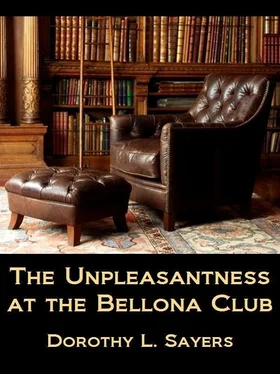“Considering how rude you were to her and Miss Dorland, George, I wonder she even left you the seven thousand.”
“What’s seven thousand to her? Like a five-pound note to any ordinary person. An insult, I call it. I daresay I was rude to her, but I jolly well wasn’t going to have her think I was sucking up to her for her money.”
“How inconsistent you are, George. If you didn’t want the money, why grumble about not getting it?”
“You’re always putting me in the wrong. You know I don’t mean that. I didn’t want the money — but the Dorland girl was always hinting that I did, and I ticked her off. I didn’t know anything about the confounded legacy, and I didn’t want to. All I mean is, that if she did want to leave anything to Robert and me, she might have made it more than a rotten seven thousand apiece.”
“Well! don’t grumble at it. It would be uncommonly handy at the moment.”
“I know — isn’t that exactly what I’m saying? And now the old fool makes such a silly will that I don’t know whether I’m to get it or not. I can’t even lay hands on the old Governor’s two thousand. I’ve got to sit here and twiddle my thumbs while Wimsey goes round with a tape measure and a tame photographer to see whether I’m entitled to my own grandfather’s money!”
“I know it’s frightfully trying, darling. But I expect it’ll all come right soon. It wouldn’t matter if it weren’t for Dougal MacStewart.”
“Who’s Dougal MacStewart?” inquired Wimsey, suddenly alert. “One of our old Scottish families, by the name. I fancy I have heard of him. Isn’t he an obliging, helpful kind of chap, with a wealthy friend in the City?”
“Frightfully obliging,” said Sheila, grimly. “He simply forces his acquaintances on one. He—”
“Shut up, Sheila,” interrupted her husband, rudely. “Lord Peter doesn’t want to know all the sordid details of our private affairs.”
“Knowing Dougal,” said Wimsey, “I daresay I could give a guess at them. Some time ago you had a kind offer of assistance from our friend MacStewart. You accepted it to the mild tune of — what was it?”
“Five hundred,” said Sheila.
“Five hundred. Which turned out to be three-fifty in cash and the rest represented by a little honorarium to his friend in the City who advanced the money in so trustful a manner without security. When was that?”
“Three years ago — when I started that tea-shop in Kensington.”
“Ah, yes. And when you couldn’t quite manage that sixty per cent per month or whatever it was, owing to trade depression, the friend in the City was obliging enough to add the interest to the principal, at great inconvenience to himself — and so forth. The MacStewart way is familiar to me. What’s the dem’d total now, Fentiman, just out of curiosity?”
“Fifteen hundred by the thirtieth,” growled George, “if you must know.”
“I warned George—” began Sheila unwisely.
“Oh, you always know what’s best! Anyhow, it was your tea business. I told you there was no money in it, but women always think they can run things on their own nowadays.”
“I know, George. But it was MacStewart’s interest that swallowed up the profits. You know I wanted you to borrow the money from Lady Dormer.”
“Well, I wasn’t going to, and that’s flat. I told you so at the time.”
“Well, but look here,” said Wimsey, “you’re perfectly all right about MacStewart’s fifteen hundred, anyway, whichever way the thing goes. If General Fentiman died before his sister, you get seven thousand; if he died after her, you’re certain of his two thousand, by the will. Besides, your brother will no doubt make a reasonable arrangement about sharing the money he gets as residuary legatee. Why worry?”
“Why? Because here’s this infernal legal rigamarole tying the thing up and hanging it out till God knows when, and I can’t touch anything.”
“I know, I know,” said Wimsey, patiently, “but all you’ve got to do is to go to Murbles and get him to advance you the money on your expectations. You can’t get away with less than two thousand, whatever happens, so he’ll be perfectly ready to do it. In fact, he’s more or less bound to settle your just debts for you, if he’s asked.”
“That’s just what I’ve been telling you, George,” said Mrs. Fentiman, eagerly.
“Of course, you would be always telling me things. You never make mistakes, do you? And suppose the thing goes into Court and we get let in for thousands of pounds in fees and things, Mrs. Clever, eh?”
“I should leave it to your brother to go to Court, if necessary,” said Wimsey, sensibly. “if he wins, he’ll have plenty of cash for fees, and if he loses, you’ll still have your seven thousand. You go to Murbles — he’ll fix you up. Or, tell you what! — I’ll get hold of friend MacStewart and see if I can’t arrange to get the debt transferred to me. He won’t consent, of course, if he knows it’s me but I can probably do it through Murbles. Then we’ll threaten to fight him on the ground of extortionate interest and so on. We’ll have some fun with it.”
“Dashed good of you, but I’d rather not, thanks.”
“Just as you like. But anyway, go to Murbles. He’ll get it squared up for you. Anyhow, I don’t think there will be any litigation about the will. If we can’t get to the bottom of the survivorship question, I should think you and Miss Dorland would be far better advised to come to a settlement out of Court. It would probably be the fairest way in any case. Why don’t you?”
“Why? Because the Dorland female wants her pound of flesh. That’s why!”
“Does she? What kind of woman is she?”
“One of these modern, Chelsea women. Ugly as sin and hard as nails. Paints things — ugly, skinny prostitutes with green bodies and no clothes on. I suppose she thinks if she can’t be a success as a woman she’ll be a half-baked intellectual. No wonder a man can’t get a decent job these days with these hard-mouthed, cigarette-smoking females all over the place, pretending they’re geniuses and business women and all the rest of it.”
“Oh, come, George! Miss Dorland isn’t doing anybody out of a job; she couldn’t just sit there all day being Lady Dormer’s companion. What’s the harm in her painting things?”
“Why couldn’t she be a companion? In the old days, heaps of unmarried women were companions, and let me tell you, my dear girl, they had a much better time than they have now, with all this jazzing and short skirts and pretending to have careers. The modern girl hasn’t a scrap of decent feeling or sentiment about her. Money — money and notoriety, that’s all she’s after. That’s what we fought the War for — and that’s what we’ve come back to!”
“George, do keep to the point. Miss Dorland doesn’t jazz—”
“I am keeping to the point. I’m talking about modern women. I don’t say Miss Dorland in particular. But you will go taking everything personally. That’s just like a woman. You can’t argue about things in general — you always have to bring it down to some one little personal instance. You will sidetrack.”
“I wasn’t side-tracking. We started to talk about Miss Dorland.”
“You said a person couldn’t just be somebody’s companion, and I said that in the old days plenty of nice women were companions and had a jolly good time—”
“I don’t know about that.”
“Well, I do. They did. And they learned to be decent companions to their husbands, too. Not always flying off to offices and clubs and parties like they are now. And if you think men like that sort of thing, I can tell you candidly, my girl, they don’t. They hate it.”
Читать дальше












